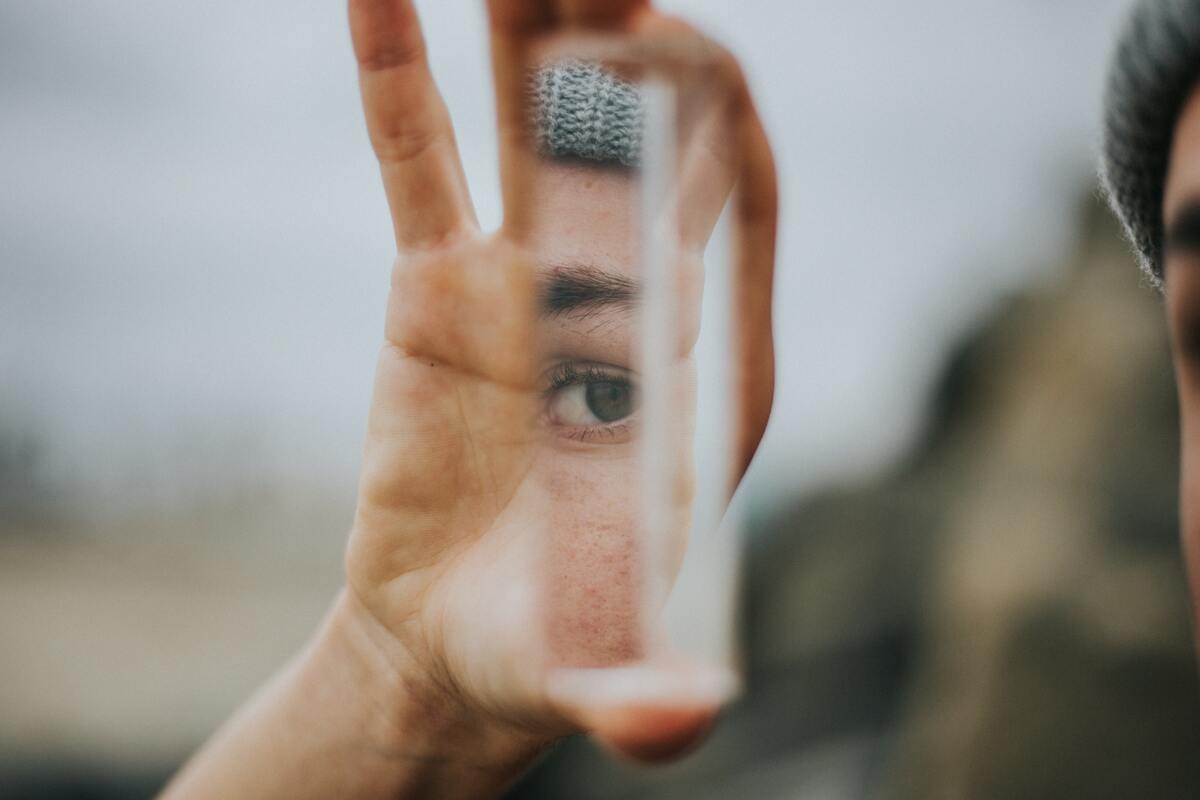
If you take initiative to get to know yourself on a deeper level, it can help you build a strong and healthy sense of self. When you get to know yourself better, it will also help you trust yourself more, gain confidence, make better decisions, and set healthier boundaries in life. When you know yourself better, it can also help you live a more purposeful, authentic and intentional life that is aligned with your core values and goals.
Many people who have not taken the time to truly get to know themselves risk experiencing an identity crisis.
Discovering the truth about who you are as a person helps you in many ways, and improves your relationships. When you know get to know yourself and gain that strong sense of self, you will find that you are less reactive and more receptive in tough conversations or challenging situations. Not only that, truly understanding who you are will help you get what you want out of life. This is because when you genuinely know yourself, your actions and behaviors will be guided by your true values, goals, passions, personal limits and ambitions, instead of by reactive emotions.
Getting to know yourself also helps tremendously with building up your self-love, which is crucial for your mental health.
Sadly, many of us become detached or disconnected from who we are, and have difficulty connecting with our true selves, thus having trouble discovering ourselves. Some of us hide from ourselves instead of getting to know ourselves. Many of us develop coping mechanisms to avoid facing ourselves, and form unhealthy thought patterns which keep us from living an authentic life.
Maggie Holland, a mental health counselor based in Washington, explains, “There are so many ways that a person can struggle or even suffer if they don’t know themselves. Limited self-knowledge can and will impact every area of your life, including your work or school life, your relationships, your self-confidence, and your ability to take care of yourself. Not knowing and trusting yourself makes it difficult to set boundaries when you need them, advocate for yourself, control anxiety and uncertainty, and overall to feel a sense of autonomy and faith in any situation.”
If you have been feeling lost, empty, confused, depressed, anxious, unfulfilled, or you’re feeling a lack of purpose, these are clear signs you need to get to know yourself better. There’s no better time to start reconnecting with yourself, understanding who you truly are, and taking steps to get to know yourself better.
Below are 11 clever ways to get to know yourself better:
1. Figure Out What Your Core Values Are to Get to Know Yourself
Holland advises starting out with a big list of core values, easily found online, where you can read common core values and instinctively know which ones align with you.
Holland explains, “First, go through and highlight the core values that are important to you, and cross out ones that are not important to you. Don’t spend a lot of time in this first round, just go with your gut reaction.”
Your gut reaction is important, since your intuition knows more about yourself than you think.
Holland continues, “Next, go through the ‘important’ list and identify which ones are ‘very important’ versus just ‘important’ to you. Again, don’t spend a ton of time, just follow your gut.”
“Finally, go through that ‘very important’ list, and pick your top core values. See how far you can get the list narrowed down. If you’ve identified your top 20, can you narrow it down to your top 15? If you’re feeling really ambitious, put them in order of importance. When you have a good sense of what your top 5-10 values are, you now have a foundation that you can draw on to make life decisions.”
In life, making decisions is extremely challenging for many people – especially big decisions. When you haven’t taken the time to get to know yourself on a deeper level, it’s common to be very indecisive. Holland advises, “If you are struggling to make a decision, factor in your top core values and see if there is a decision that aligns the best with those values. Whether the decision plays out like you hope it will or not, at least you will know that you made the decision that was best for you.” You can make decisions that are true to who you are and what you stand for when you know yourself better.

2. Journal
Journaling is a great way to sift through the contents of your mind to get to the root of what truly matters to you. When journaling, let yourself write what comes to mind without passing judgment. There are many ways in which to journal, including bullet journaling, dream journaling, and stream of consciousness journaling. Holland advises focusing on what bothers you.
“Using a stream of consciousness approach or by recounting the situation, go back over it to pinpoint the place that bothers you the most, or where things ‘went wrong’. By focusing on things that happened that bothered you, you get a good idea of the pieces of yourself that you’re trying to ignore or deny. You can’t connect fully to who you are if there are aspects of yourself and your feelings that you’re trying to ignore or minimize, so this is a great place to start.”
Some journals are designed with the purpose of helping you get to know yourself better. Many journals have journal prompts on different pages that prompt you to answer specific questions about yourself.
3. Go to Counseling Sessions
There are many reasons why everyone should go to therapy, and one of those reasons is that therapy sessions (counseling sessions) are an excellent way to get to know yourself better. Your therapists will ask you unique questions that get you discovering more about who you truly are, and what you truly stand for.
Therapy, coaching or counseling are very effective resources you can use if you’re trying to get to know yourself better. A therapist can offer you a different perspective, help you build a meta cognition, and guide you through conversations that prompt self-reflection as well as self-discovery.
Minds are tricky things, bouncing hundreds if not thousands of thoughts through our heads every day, and trying to sort through them all without judgment or doubt can be difficult. Your therapist can challenge you and ask you questions that you might not think to ask yourself, and your answers can provide some valuable insight into why you might be feeling, thinking, or reacting in a certain way.
4. Take a DNA Test
One of the most incredible ways to learn more about yourself is to take a DNA test and discover DNA insights that reveal a ton of information about you. Not just any DNA test, though. The Premium DNA testing kit from CircleDNA doesn’t just give you ancestry information. It also provides you with over 500 reports about yourself, across 20 categories, so you can learn how your unique DNA makes you special. The 500 reports about yourself in this CircleDNA test can shed some light on your personality and success traits, as well as your physical and behavioral traits. These DNA insights will also reveal things you might be genetically gifted at, as well as your thinking speed and even your physical strengths.

5. Spend Time Alone in Nature, Self-Reflecting
Being alone in a peaceful environment provides you with the opportunity for self-reflection. Being alone in nature without the distractions of city noise, message alerts and to-do lists lets you dive deeply into self-reflection. A few times per month, take a walk or go for a hike and let your mind wander. Take the time to reflect on your week, and ask yourself questions that guide you toward discovering your true feelings and what your goals, hopes, challenges, dreams and desires are.
6. Visualize or Create a Vision Board
What do you want your life to look like 5, 10, or 15 years from now? What do you imagine for yourself? The process of visualization or creating a vision board can reveal a lot about yourself.
Take a few minutes to close your eyes and imagine yourself in the future. What kind of career do you have? Do you have children? Where do you live? Where have you traveled? If you feel lost or unsure of the trajectory of your life, visualize your ideal life and ask yourself if the way you’re living now is going to get you there. If the answer is no, what changes can you make?
You can start making life decisions that align with your goals after you visualize what you want in the future.
7. Try New Things Such as New Hobbies
To get to know yourself better, you need to discover much more about your likes and dislikes. What helps you discover this is trying new things, such as signing up for classes (such as a piano class or a cooking class) or joining a team (like a soccer team) or trying a new hobby (such as a water sport.)
It’s difficult to truly get to know yourself if you don’t try new things and give yourself to discover what you truly love. You’ll never know if you’ll love something until you give it a try. What is something you have always wanted to learn but never got around to? Whether it’s cooking or playing an instrument, learning a new skill pushes you outside of your comfort zone and teaches you quite a bit about your patience, perseverance, and true passions.
Furthermore, trying new things such as joining sports teams or taking continuing education classes helps us meet new people, and new relationships can help us learn a lot about ourselves. New friendships or relationships help us learn about ourselves through the other person’s eyes, which ultimately spurs us to reflect and see ourselves more clearly.
8. Ask Yourself Questions
It’s easy to lose sight of ourselves or disconnect from ourselves amidst stress and the rapid pace of everyday life. Make a habit of setting aside 5 minutes a few times per day to check in with yourself. Be aware of bodily sensations, as they can give you clues to what emotions you may be experiencing. Be kind to yourself and look within, with curiosity and not judgment. Explore why you might be feeling an emotion. When we feel ‘negative’ emotions such as sadness, anger or fear, it means that something has happened to violate one of our core values. Asking yourself questions such as why you’re feeling a certain way can give you insight into what your core values truly are, which as we’ve mentioned, majorly strengthens our sense of self. You need to know your core values to form your identity and feel confident that you know who you are.

9. Reflect on Questions About Your Past
Your past shapes who you are quite significantly. Especially if you’ve been through trauma or major milestones in life. The easiest way to get to know anyone is to ask questions, and reflect on the answers. Your therapist can provide you with lists of questions to ask yourself to get to know yourself better, or you can easily find questions to answer online. Some examples of questions to reflect on to gain a better sense of self include:
- What is my happiest memory?
- Which personality traits am I most proud to possess?
- What stands out as a core wound or significant trauma?
- What are my strengths and weaknesses?
- What am I ashamed of?
- What is my proudest accomplishment?
If there are things about yourself that upon reflection, you’d like to change, that’s always possible. As you learn and grow throughout your life, you’ll gain new perspectives and deeper compassion for yourself.
10. Own Your Flaws and Face Your Demons
Everyone has flaws, yet many people associate their flaws with a feeling of shame. The thing about shame is that it’s a very powerful feeling. When we carry shame, we can’t see ourselves clearly for who we really are. Instead, we see what our shame tells us to see. Maggie Holland explains, “Shame is when we think negatively about a core piece of who we are because we feel that we ‘should’ feel or act differently. Oftentimes, we try to use shame as a motivator, but shame only attacks our sense of self and makes us feel bad — which actually immobilizes us.”
Holland continues, “Every single person has parts about themselves that they like and they don’t like. Watch yourself when you’re using the word ‘should’ when you’re thinking about your thoughts, feelings and behaviors. When you catch yourself ‘should-ing’ yourself, recognize that that is not a way to motivate you to change. It’s also really important to note that we can often feel shameful about certain emotions such as sadness or anger. All of your feelings are just important indicators of your needs. Treat them as wise messengers instead of something to be controlled and managed.”
11. Listen to Your Intuition
Your intuition is that gut feeling that either prompts you to take a certain action and make a specific decision, or advises against it. Everyone has intuition, and it often speaks up before we even notice it. Our intuition is a real, measurable psychological phenomenon. A big component of intuition is that it subconsciously draws on our past experiences and core memories, as well as personal and environmental factors, to inform our decisions. For example, if we have been scarred by trauma, we might have a hard time listening to our intuition because past experiences might have taught us to fear taking certain actions. Listen (and talk back) to your intuition, again with curiosity, not judgment.
The Bottom Line
Having a strong sense of self is incredibly important because knowing who you are will help you make very important decisions in your life the right way – the way that aligns with your goals and values.
Holland explains, “When you don’t know yourself or your values, it’s hard to trust yourself to make decisions that are the best fit for you. Think of knowing yourself well as the key to keeping you centered or ‘tethered’ throughout every important decision, you will ever make during your life.”
Remember that you can uncover a wealth of information about yourself through DNA insights. CircleDNA offers hundreds of reports about yourself, and it’s the world’s most comprehensive DNA test which goes far beyond reporting your ancestry information. If you’re ready to get to know yourself better, get your CircleDNA test today.







Comments are closed.